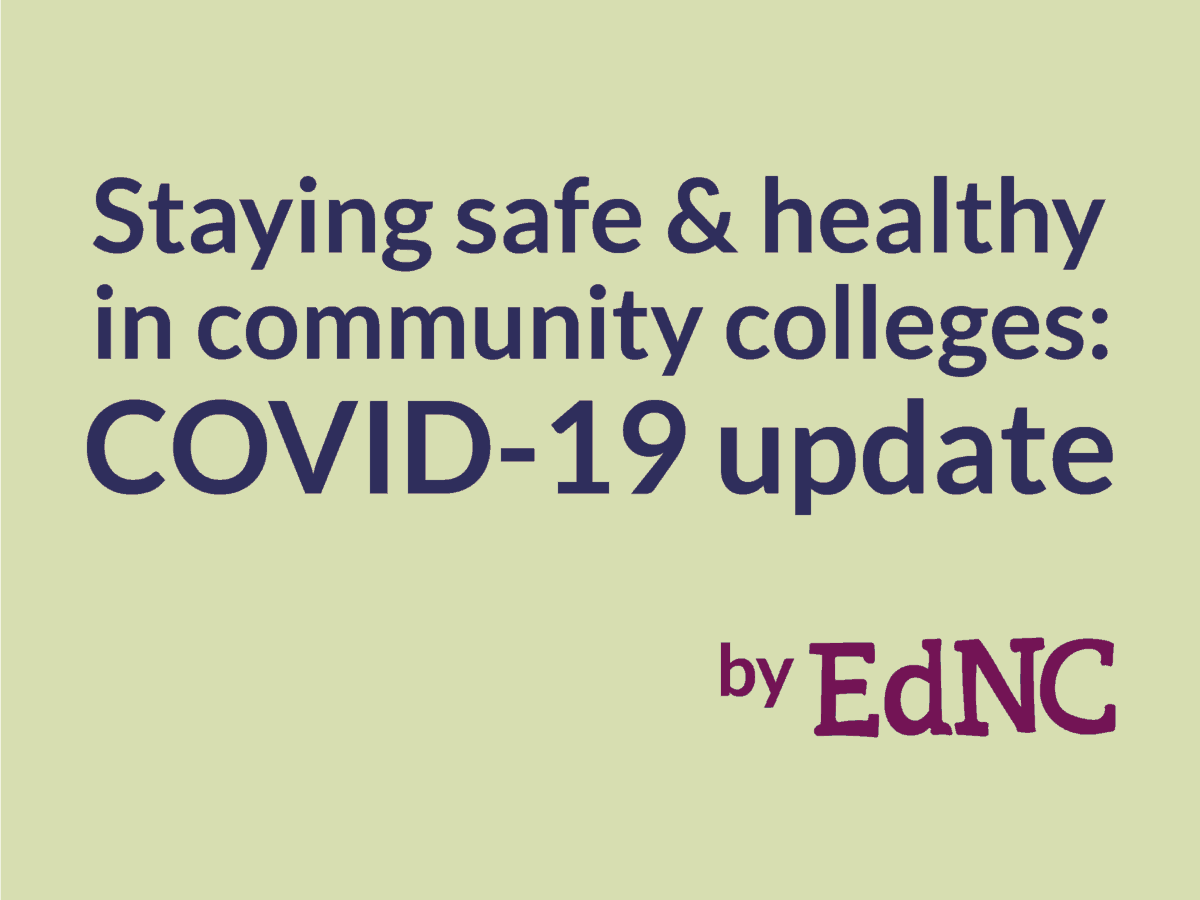
On Friday, the State Board of Community Colleges began allocating federal funds provided by the General Assembly to address the impacts of COVID-19.
Recently, the General Assembly passed and the governor signed a bill appropriating about $1.6 billion of the $3.5 billion provided to the state through the federal Coronavirus Aid, Relief, and Economic Security (CARES) Act.
As part of that, the community college system received $25 million.
During its meeting today, the State Board approved almost $3 million of that for additional counseling hours at community college small business centers around the state. Community colleges will get $51,724 each.
These small business centers are part of the Small Business Center Network. Each community college has a center that helps with things like starting new businesses, expanding existing businesses, and creating jobs.
The Board also approved an allocation of $3 million for additional college and career counselors and academic advisors for community colleges, and $250,000 for cybersecurity awareness training for community colleges.
The cybersecurity training has particular importance after a cyber attack shut down Richmond Community College last summer.
Community College System President Peter Hans talked about the financial position facing the state during the meeting. At the moment, the state is anticipating a possible $4 billion shortfall and has a little over $3 billion of state money on hand to deal with it.
The federal CARES Act money can’t currently be used to address such shortfalls, but the General Assembly held back some of its federal funding in the hopes that would change.
The limitations of the CARES Act funding has particular implications for the community college system. It had asked for $25 million for a reserve fund that could be drawn from for community colleges to make up for a loss in student receipts during the COVID-19 crisis.
“The feds said you cannot apply this CARES Act funding to the state for receipt shortfalls,” Hans said. “So this is a little bit of an issue for us.”
The General Assembly did, however, give the community college system $25 million to be used for the following five things.
- “To enhance online learning capacity and cover increased costs associated with moving to online education for students.”
- “To cover necessary eligible expenses for resources and supports for faculty and staff.”
- “To provide Small Business Center counselors for small business needs.”
- “To cover expenses for expanded demands on information technology, including devices for campuses in rural areas.”
- “To provide facility sanitation and other necessary eligible expenses for services for ongoing campus operations.”
“It is clear we need to carefully think about the usage of the rest of that $25 million,” Hans said after the Board approved the allocation of some of it today.
He said the Board needed to consider how to spend it for things like changes in instruction delivery, online learning, and rural support.
The state’s community colleges are also directly receiving $120,073,308 in CARES Act funding, much of which is for student relief.
Meanwhile, as the short session of the General Assembly gets ready to continue on Monday when lawmakers return to Raleigh, legislation has been filed to address some of the community college system’s legislative priorities.
A bill filed by Rep. John Sauls, R-Lee would give $40.2 million in recurring funds for enrollment growth at the state’s community colleges, and $62 million for salary increases for community college personnel. That would provide a salary increase of 5% to the personnel.
These are both important priorities for the community college system. After years of declining enrollment at colleges around the state, the system saw a surge in the 2018-19 school year.
For that year, enrollment increased at 53 of the state’s 58 community colleges. Systemwide, enrollment at community colleges increased 4.4%. Workforce programs saw a 9.4% increase and curriculum programs a 3.8% boost.
With the sudden increases, community colleges around the state are looking for more funding to support additional students.
Increasing faculty pay was a legislative priority of the community college system during the last long session of the General Assembly. A bill would have provided the much-needed increases for faculty pay at community colleges, among other things, but it was vetoed by the governor.
Gov. Roy Cooper gave the following explanation for his veto in a press release.
“The General Assembly shortchanges our universities and community colleges and their employees, as well as state retirees, despite a robust economy and decent raises for other state employees,” he wrote. “Higher education is North Carolina’s best economic development tool, and we must invest in education to keep it that way.”
Hans also talked a little bit about the changing face of instruction at community colleges. Initially, the guidance given to community colleges was that in-person instruction should end except for in vital areas like public health and safety. Hans said that as Cooper moved the state into phase one of the reopening of the economy, additional guidance was given to colleges that they could provide in-person instruction for other courses, such as in the trades.
He said, however, that the advice is to only do that if the participants all agree and classes can be held safety.
“The operations I’ve seen thus far have given me … a lot of encouragement,” he said.
Hans said that he expects community college system guidance to colleges will continue to change as Cooper opens up the economy further.
In other COVID-19 news, the Board voted to waive a requirement for post assessment scores for career and technical education (CTE) students in high school.
Basically, there are high school students who can get college credit for some of their CTE courses, but they have to have a B and get a 93 on a post-course assessment.
“With what is going on with COVID-19, it has impacted this requirement,” said Board member Sam Powell.
Due to COVID-19, it is difficult for those students to take the post assessments, so the Board waived that requirement temporarily.




